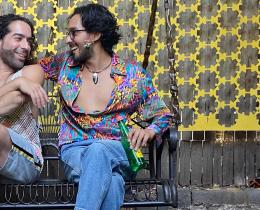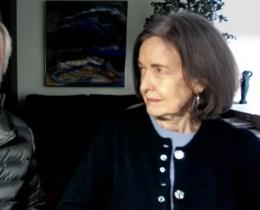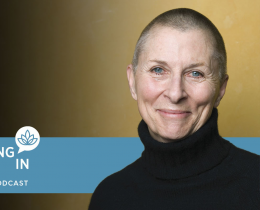Omega: You say you’re leading a love revolution. How do you define love?
Matt: I define love as the spiritual magnetism that brings all hearts together. As human beings, when we meet others, we have an inner magnetism toward spiritual expansion that inspires us to know ourselves as greater than how we typically define ourselves to be. When we’re in the presence of others, we are triggered to remember our absolute self—which is love.
Omega: Is there an endless supply of love, or a limited amount that you have to be careful to regulate?
Matt: Love is the infinite capacity of your soul that is manifested as the very breath you breathe. Our capacity to love is as infinite as our breath is throughout all lifetimes. It’s not something we need to objectify, covet, or protect. It’s the very force that protects us when we’re willing to love courageously.
A lot of us have experiences of our power being taken away from us when we dare to love. And frequently when we love there is disappointment and hardship and betrayal. As we dare to love more openly and more often, we find ourselves actually safer because we’re not hiding the light of our love from the world. Love is the courage to shine the light that’s within each of us. It’s in living on the edge of openness that we find a safe space within our own reality and live a more fulfilling life.
Omega: You like to say that love is the answer to every question. What do you mean by that?
Matt: We have a tendency to think we have to come up with an answer to all questions. But from a heart-centered perspective, not all questions need verbal answers. Some people ask questions because they want love, attention, approval, or recognition from others—we often see this in children, but many adults do this, too.
So when people ask me questions, sometimes there’s a real need for guidance or clarity, but oftentimes the question is just asking for attention and it’s a reminder to me to stop and love, honor, and adore the questioner. When we do this, we give the questioner the chance to see that there are no answers outside of us. They can learn that no outside person or circumstance can give them the answers.
Omega: You’re not saying we don’t need to answer each other’s questions, are you?
Matt: We don’t want to stop talking to each other, but this is the Information Age, and it’s obvious that no amount of information is going to get us to love, otherwise we’d be there by now. We used to think answers to our questions would get us where we want to go. But the world needs tangible, practical, real, authentic experience and insight—which only comes in the present moment, without words, and in the state of love. You can still speak, but if your words are masking presence instead of being a carrier of presence and love, then it’s just information.
Omega: What role does love play in working with negativity, whether it’s directed toward ourselves internally or negativity we experience externally with others?
Matt: Negativity is not the way of love because negativity is the over-reactivity of repressed emotions. That which has been repressed is needing love, but we live in a world where people hold back love until someone acts appropriately—it’s like once you've earned it through good behavior, then I'll give you the toy or, in this case, the reward called love.
It can help to think of ourselves as children. We know that when a child is processing repressed emotions or expressing dormant energy, such as anger and sadness, we see them through the eyes of compassion. For example, when a child loses a parent and cries with grief, we see a person who needs the companionship and the recognition of love as a way to get through it.
We can see our collective negativity as a sign of a world of beings who are steeped in a healing crisis. The world is full of a bunch of crying, innocent children who are just begging to be loved, recognized, and held while they take time to feel what often makes them feel anything but safe.
Sometimes the only way for people to express their bottled up feelings is to make it about someone else, to direct the negativity outward. As long as we’re in situations where people are not using negativity to abuse us mentally, verbally, physically, or otherwise, we have the opportunity, through the vibration of love, to be wiser and more mature than people’s patterns of reactivity.
To be able to provide that to ourselves or others, that togetherness is the only way we are going to get through this time and come out the other side brighter and more evolved than ever before.
Omega: How can we learn to stay in our own center and not get pulled into another’s negativity?
Matt: We are often drawn to negative people and situations because of the intensity of the feelings. (It’s the same with positive feelings, too.) The first step is to learn to stay in your own body, to stay relaxed in the presence of negativity instead of moving to your own default, reactionary setting. Often when we encounter negativity, it reminds us of times in our past when we didn’t feel safe, so it’s only a matter of moments before we shut down or lash out. Instead we can learn to relax, to soften our body and return to our breath. We reassure our nervous system that this isn’t like earlier experiences, that we have the intelligence to navigate the situation with love instead of shutting down.
Omega: Do you encourage people to set boundaries?
Matt: Sometimes we have to set boundaries because sometimes boundaries are the only way for people to learn. If we’re going to set a boundary, we always convey that with the most lovingkindness. We want to think about what is the most loving and authentic expression of that boundary.
Omega: What’s one of your favorite ways to help people bring more love into their life?
Matt: A key practice I use is from my first book, Whatever Arises, Love That. It’s called "Creating Your Personal Love Statement." You can either do this through a quick meditation or as a writing exercise, but you come up with a sentence or two that you either never heard as a child and have been waiting your entire life for someone to say to you. Think of that thing you wish your parents had said or that you’ve been waiting for the perfect partner to say to you, something that would completely melt your heart and make you feel totally safe and fulfilled. It could be something as simple as, “I love you,” or “I see you,” or even “I’m sorry.” It could be, “Thank you for shining your light,” or “I want to get to know you better,” or “You have so much to give.”
Write them down and say those words to your heart. When you do, the love that is already present in you can wake up. You don’t have to wait for others to tell you these things. You don’t have to hold your life hostage waiting for love—you can be the one to offer love to yourself right now.



